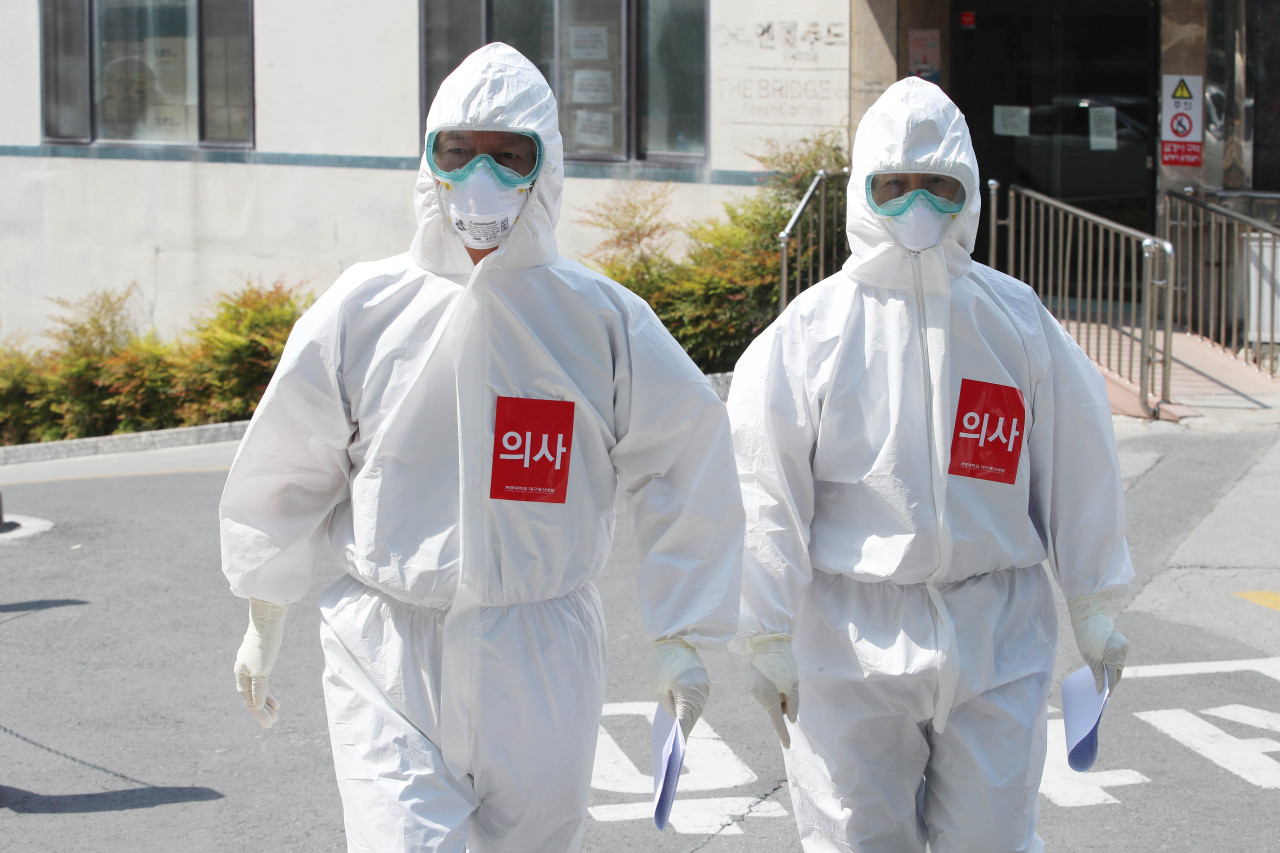With lax social distancing in store, virus curve flattens for days
By YonhapPublished : April 28, 2020 - 10:24

South Korea reported fewer than 15 cases of the new coronavirus for the 10th day in a row Tuesday, with the upcoming holidays set to be crucial in whether the country can go ahead with a lax social distancing drive next week.
The country reported 14 new virus cases, bringing the nation's total infections to 10,752 in 100 days, according to the Korea Centers for Disease Control and Prevention (KCDC). The country reported its first COVID-19 case on Jan. 20.
Health authorities, however, warned that the COVID-19 pandemic is still "persisting" in the country amid the rising number of imported cases and concerns over cluster infections.
Of the newly added cases announced Tuesday, 12 were imported, raising the country's total number of such cases to 1,056. Half of the new imported cases were from Europe.
The nation's death toll from COVID-19 rose by one to 244.
The fatality rate came to 2.27 percent, with victims aged 80 and above accounting for more than half of the reported deaths.
No deaths were reported among those aged 29 and below, though the age group accounted for a third of confirmed patients.
In total, 8,854 people in South Korea have recovered from the virus, up 90 from a day earlier. More than 80 percent of the COVID-19 patients have been cured.
In one hundred days since the first COVID-19 case here, the country has managed to control the spread of the virus, according to health authorities.
"We have been able to stem the further spread of the virus on the back of quick and massive testing," Yoon Tae-ho, a health ministry official, said at a daily press briefing. "But we need to stay alert over another potential wave of infections at any time," he said.
South Korea has received requests from other countries for exports of test kits or humanitarian aid. "South Korea is willing to help other countries by taking various circumstances into account," Yoon added.
The country is currently capable of carrying out up to 23,000 tests on a daily basis.
Daegu, the nation's worst virus-hit region located 300 kilometers south of Seoul, added just two cases. The city accounts for 64 percent of the nation's total COVID-19 cases.
South Korea has carried out 608,514 tests for the coronavirus since Jan. 3, including 6,854 tests carried out a day earlier.
Local health authorities remain vigilant ahead of the upcoming long holiday, when a large number of people are expected to make short domestic trips.
South Korea will celebrate Buddha's Birthday on Thursday, followed by May Day on Friday and Children's Day on May 5.
Authorities have been urging South Koreans to refrain from making group tours during the holiday, saying this week will play a decisive role in paving the way for the country to move on to an "everyday life quarantine" in May.
"We need to keep in mind that even slight carelessness will make our efforts end in vain and lead to another major pandemic," Yoon said. "Considering the nature of the COVID-19 virus, containing cluster infections is the key to avoiding the second wave of infection."
The country nevertheless has been gradually easing social distance guidelines in sync with the falling number of new COVID-19 cases.
It plans to announce new guidelines for schools by early May, with options that include having students come to school at different times.
While South Korea started to use electronic wristbands equipped with a location-tracking system on people who violate self-isolation rules this week, no bands have been applied yet.
KCDC Deputy Director Kwon Jun-wook said health authorities are considering testing a sampling of a population for antibodies but will require a lot of time to actually do so since they need to be very careful from choosing test reagents to sample collecting methods.
If health authorities decide to conduct antibody tests, Kwon said residents in Daegu and its surrounding North Gyeongsang Province, the nation's two worst virus-hit regions, will likely be the first target.
Health authorities expect to secure at least 750 clinical materials from the two regions.
Citing studies from overseas, Kwon said 40 percent of virus transmissions happened when a patient was in the presymptomatic or asymptomatic period, emphasizing that health authorities are trying to reinforce their epidemiological system to fully contain the spread of COVID-19.
Kwon also added that health authorities will discuss with the country's central clinical committee adding the loss of taste or smell as symptoms of the new coronavirus after cases in other countries reported such symptoms. (Yonhap)









![[Hello India] Hyundai Motor vows to boost 'clean mobility' in India](http://res.heraldm.com/phpwas/restmb_idxmake.php?idx=644&simg=/content/image/2024/04/25/20240425050672_0.jpg&u=)









